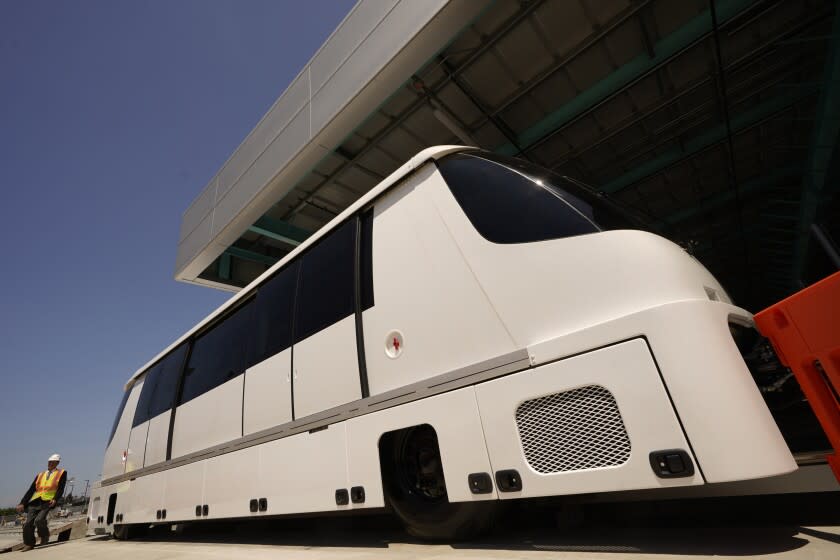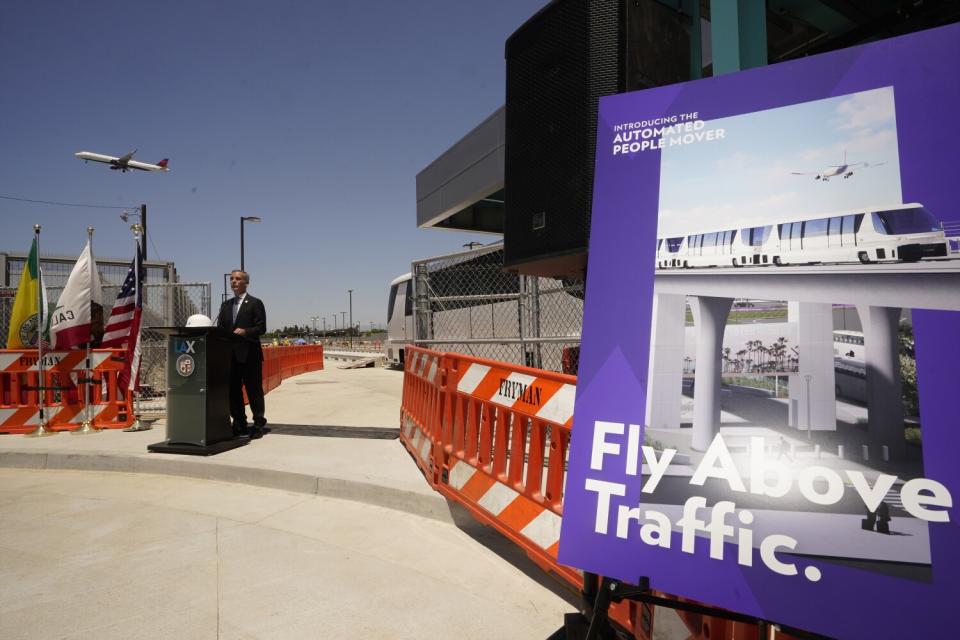LAX's traffic nightmare could end with new people mover, but you'll have to wait

- Oops!Something went wrong.Please try again later.
The running joke among Angelenos is that the seven words people least want to hear is "Can you pick me up at LAX?"
City officials hope the line loses its punch soon as the long-promised people mover comes closer to completion. The first automated cars for Los Angeles International Airport's electric people mover arrived this week, heralding a major milestone for the $2-billion project that's expected to be completed by 2023.
"After decades of saying no, of airport directors who said I don't want to give up my parking revenues ... of people rolling their bags down Century Boulevard asking friends to pick them up or drop them off, the hell that we knew LAX as is going to be a thing of the past," said Mayor Eric Garcetti, standing in front of a shiny white electric car that one airport official affectionately called "Bonnie."
The free system that runs along an elevated 2.25-mile track promises to ease the maddening gridlock that's a staple of the airport. The cars, when fully running, will be able to ferry 10,000 passengers an hour in and out of the teeming airport, one of the world's busiest.
An estimated 200,000 people move through the airport daily. The 12-seat cars can go about 50 mph and will take about 10 minutes to go from end to end of the system with stops at six stations.

"If you're departing or deplaning during peak hours," Garcetti said, "you'll be able to board a sleek, spacious car every two minutes."
LAX has gained a reputation as a perennially difficult airport and been ranked by periodicals and surveys as one of the nation’s most congested and hardest to navigate. More than $15 billion has been poured into a years-long modernization plan that's expected to be completed next year.
"We're completely transforming how the traveling public gets to and from LAX. The centerpiece of that modernization is our automated people mover," said Justin Erbacci, chief executive of the Los Angeles World Airports. "When open, guests and employees will be able to soar above traffic, never again having to come into the central terminal area with their car. Unless, of course, they really want."
He added: "With the World Cup coming in 2026 and the Olympics in 2028, we will roll out the red carpet like never before in our history."
The guideway for the people mover is largely constructed, but crews are still working on the six station stops. There are three stops in what's known as the central terminal area, basically the center of the airport where the parking lots are. Those stations will have pedestrian walkways leading to terminals.
The other stations are located off-site, one at a consolidated rental car facility, another at a parking facility. The last station is called the airport Metro connector station. It links to Metro's larger system connecting to the yet-to-open Crenshaw/LAX Line. The Crenshaw line runs from the airport east to Crenshaw Boulevard and ends at the Expo Line.
The city purchased 44 cars that are being manufactured in Pittsburgh by the French company Alstom. The first cars were brought on a flatbed to the airport this week, and the rest will arrive in the weeks ahead. Testing will begin early next year.
The aluminum-shelled cars are 95% recyclable and generate power every time they brake, using the kinetic energy produced during decelerating, much like Teslas.
This story originally appeared in Los Angeles Times.

